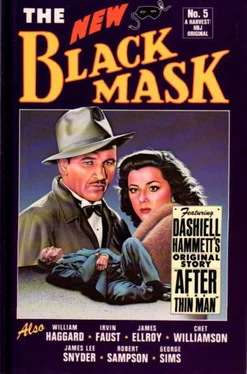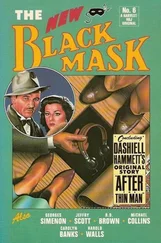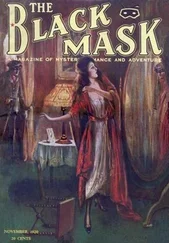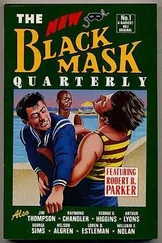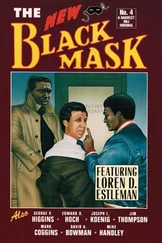William Haggard - The New Black Mask (No 5)
Здесь есть возможность читать онлайн «William Haggard - The New Black Mask (No 5)» весь текст электронной книги совершенно бесплатно (целиком полную версию без сокращений). В некоторых случаях можно слушать аудио, скачать через торрент в формате fb2 и присутствует краткое содержание. Год выпуска: 1986, ISBN: 1986, Издательство: A Harvest/HJB book Harcourt Brace Jovanovich, Жанр: Детектив, на английском языке. Описание произведения, (предисловие) а так же отзывы посетителей доступны на портале библиотеки ЛибКат.
- Название:The New Black Mask (No 5)
- Автор:
- Издательство:A Harvest/HJB book Harcourt Brace Jovanovich
- Жанр:
- Год:1986
- ISBN:9780156654845
- Рейтинг книги:4 / 5. Голосов: 1
-
Избранное:Добавить в избранное
- Отзывы:
-
Ваша оценка:
- 80
- 1
- 2
- 3
- 4
- 5
The New Black Mask (No 5): краткое содержание, описание и аннотация
Предлагаем к чтению аннотацию, описание, краткое содержание или предисловие (зависит от того, что написал сам автор книги «The New Black Mask (No 5)»). Если вы не нашли необходимую информацию о книге — напишите в комментариях, мы постараемся отыскать её.
The New Black Mask (No 5) — читать онлайн бесплатно полную книгу (весь текст) целиком
Ниже представлен текст книги, разбитый по страницам. Система сохранения места последней прочитанной страницы, позволяет с удобством читать онлайн бесплатно книгу «The New Black Mask (No 5)», без необходимости каждый раз заново искать на чём Вы остановились. Поставьте закладку, и сможете в любой момент перейти на страницу, на которой закончили чтение.
Интервал:
Закладка:
Perhaps Angela’s changed attitude to sex was the most obvious giveaway. Before the Monday afternoon walks and the new clothes, she seemed to have regarded it as a rather boring routine matter to be managed as quickly as possible before turning away to sleep. Now she never turned away and was always ready for sex, keener than he could ever remember her being. Her kisses were open-mouthed and lingering, her embraces passionate and urgent; as he brooded on this he realised that “urgent” was the key word — that was it, she was urging him on to more effort so that he resembled, when her eyes were closed, her other, very passionate lover. Even after an orgasm she was unsatisfied, longing for something else. It would be impossible to describe the various feelings Patchin experienced as his wife became ever more knowing in bed, with wanton behaviour and explicit movements trying to get him to obtain the results she enjoyed elsewhere. One night she wanted him to make love in a new position, and as she determinedly pushed him into place he could see the grim joke of it so clearly that he nearly laughed. Nothing could make it more plain that Angela had a very virile, enthusiastic lover, much more skilled at the amatory arts than he would ever be, a lover who liked first to be inflamed by skimpy knickers and a “display” brassiere and then performed perfectly.
It was not until a Friday in the middle of June that Patchin was able to identify his enemy. He disturbed Angela while she was making a phone call when he entered Pound Cottage that lunch time a few minutes earlier than usual. As he opened the door, the telephone was slammed down, and Angela ran upstairs to cover her confusion. That afternoon Ray Johnson, the youngest postman in the area, called in at the shop ostensibly for a pound of sausages and some bacon. Johnson grinned over at Angela in the little office, calling out "Afternoon, Mrs. Patchin.” Angela did not reply but just nodded, flushing very slightly. Apart from that telltale flush there was something subtle about the way Johnson addressed her, with just an inflection of the “Mrs. Patchin,” as though the formal mode of address was something of a joke between the pair. Daniel Patchin took his time in the cold storage room to give them a chance for a few words. The moment he opened the door, Ray Johnson stopped talking and grinned foolishly as though he had forgotten what he was going to say.
Idiot, Patchin thought, you young idiot, but passed over the momentary awkwardness for Johnson by commenting on the sausages: “Cook’s specials this lot. Part of a batch I made up for the Manor. The old man likes just an extra pinch of pepper.”
Having once seen his wife with Johnson, there was no longer any doubt in Patchin’s mind, for it seemed to him as if there were some invisible but subtly tangible connection between them, an unspoken intimacy born of their long afternoons together, probably in Calcot Wood where there were some idyllic glades. As he did up the bacon and sausages and the embarrassed couple said nothing, Patchin could visualise them on a greensward in a patch of dappled sunlight, the flimsy knickers being removed together with the trick brassiere, and then Angela’s urgent movements as the mutual madness began. Patchin felt as though his obsessive thoughts might show on his usually phlegmatic face, so he cleared his throat loudly and shook his head, saying, “Sorry. Throat's a bit sore. Hope it’s not a summer cold.”
Ray Johnson gave Patchin an unusually serious, not altogether friendly look as he replied, “Yes. Let's hope not.” The look negated the banal response, and Patchin thought Liar; it would please you if I came down with pneumonia. For the first time it struck him that the feeling of jealousy might not all be on one side. Probably Johnson was also jealous of the nights when Patchin slept with Angela; possibly Johnson was coming to hate him as he had hated the unknown lover.
Later that afternoon, when Angela had gone back to the cottage to make some tea, Daniel Patchin stood at the open door of the shop staring at the pond where a pair of Canada geese had alighted and were being harried and made unwelcome by the aggressive, though small, coots which dashed in and out of the reeds, making proprietorial noises. And indeed Patchin did not miss anything that happened on the pond, noting how the mallards vanished and the white ducks kept out of the noisy quarrel like only faintly interested spectators. But Patchin’s mind was elsewhere, brooding on his predicament: it was the first time since the Korean war that Patchin felt he was faced with a problem he did not know how to handle. Ray Johnson was a tall, slight lad with curly black hair and a mouth that always seemed to be open, either grinning or laughing to show very white teeth. Johnson was easily the most popular of the local postmen; he was extremely cheerful, full of banter and old jokes. Patchin had always found that slightly irritating — but now the trifling feeling of irritation was replaced by the strong one of implacable enmity. Patchin had no intention of confronting Angela with his suspicions or of trying to surprise the lovers in the act, even though he thought it could be arranged one Monday afternoon in Calcot Wood. For all he knew, Angela might then decide to leave him — he did not know how heavily their reasonably prosperous and comfortable life together weighed against the hours of passion spent with Lothario Johnson. No, the only answer was to get rid of him as the coots would undoubtedly rid themselves of the intruding Canada geese.
After the break for tea, Patchin got down to work again. Friday evening was one of his busiest times, as dozens of joints had to be prepared for the weekend — he had some particularly choosy customers who liked to have their meat prepared in the finicky French manner, and he was quite willing to cater to their tastes. A great deal of beef had been ordered for that weekend, and his young assistant was not up to preparing it, being capable of carrying out only the humblest jobs. Patchin set the boy to mincing pork and then began butchering two sides of beef, attacking the carcase with relish.
Once supper was finished, he could hardly wait to get Angela to bed: knowing that she was the young man’s mistress had the strange, unexpected effect of doubling his lust for her. And she seemed equally ready for sex, falling back on the bed and raising her knees, smiling at him in a new way, a smile that contained a hint of amusement at his fumbling efforts to please her. This time it was his turn to be left feeling unsatisfied and empty even though he took her twice, as if possessing her half-a-dozen times would not be enough to assuage his restless yearning.
From mid-June, Daniel Patchin spent most of his Sundays in Calcot Wood; it was by far the largest area of woodland owned by Lord Benningworth. One Sunday he decided to devote to searching for clues as to the lovers’ meetingplace and did come on a bed of crushed ferns; it left him with a strange sensation and feeling slightly sick. From the improvised bed he made his way down to a deserted cottage in the remotest part of the wood, a spot that never seemed to be reached by the sun, as it stood in the shadow of Calcot Hill. It had been a gamekeeper’s cottage up to 1939, but the prewar Benningworth regime of having a gamekeeper had been dropped, and the remote, unattractive cottage was let, when Patchin was a youth, to a strange old man called Ted Ames, then left to rot. Lord Benningworth was a true conservative in that he was against change of any kind, even that of having a wreck of a building knocked down. The old widower Ames had eventually gone off his head and been taken away to a mental hospital in 1948, where he died. Since then the cottage had been stripped of its gutters and drainpipes; most of the roof was still sound, but rain had dripped in through a few missing tiles and some of the rafters were rotten, covered in mould; even on the wannest summer day the old cottage smelt of dank decay. There was fungus on the kitchen walls, and weeds were gradually invading the ground-floor rooms, sprouting up from the cracks in the brick floors.
Читать дальшеИнтервал:
Закладка:
Похожие книги на «The New Black Mask (No 5)»
Представляем Вашему вниманию похожие книги на «The New Black Mask (No 5)» списком для выбора. Мы отобрали схожую по названию и смыслу литературу в надежде предоставить читателям больше вариантов отыскать новые, интересные, ещё непрочитанные произведения.
Обсуждение, отзывы о книге «The New Black Mask (No 5)» и просто собственные мнения читателей. Оставьте ваши комментарии, напишите, что Вы думаете о произведении, его смысле или главных героях. Укажите что конкретно понравилось, а что нет, и почему Вы так считаете.
